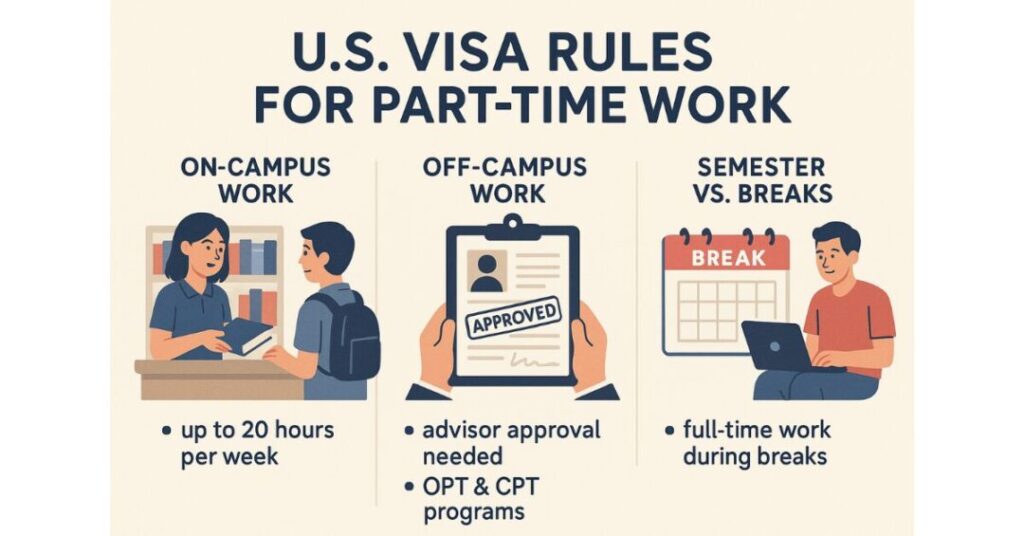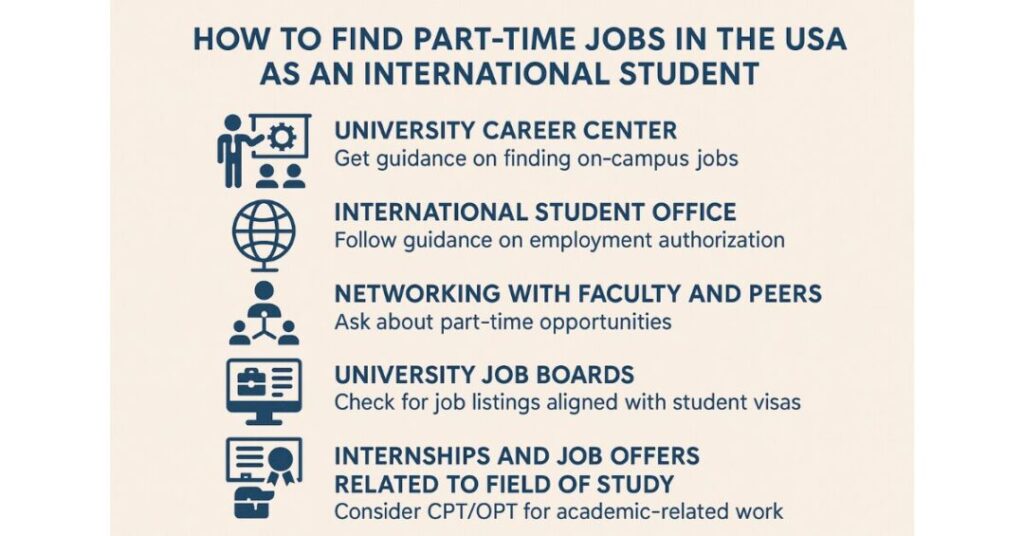12 September 2025
7 minutes read
Can You Work Part-Time While Studying in USA?

Key Takeaways
- Can we do part time job while studying in USA? Yes, F-1 students are permitted to work up to 20 hours per week on-campus, with limited off-campus options through CPT/OPT.
- Part-time jobs in USA range from library assistants to research roles, offering both income and valuable work experience for international students.
- Follow visa rules, avoid unauthorized work, and manage time wisely to succeed in both academics and employment.
Can we do part time job while studying in USA? Each year, thousands of international students, especially Indian students in USA, face the challenge of overcoming high tuition and living expenses while having very limited income options.
Many of these students contemplate whether students in the USA can work at all, but if they can, what type of rules are they bound to? Well, one thing is clear: students who hold F1 student visas can take part time jobs for up to 20 hours per week on-campus, and this has many positive implications for student employment, work experience, and even student finances.
What U.S. Visa Rules Say About Part-Time Work?
Understanding the rules of the F-1 visa will be essential for many international students in the USA prior to looking for or taking any part-time jobs in the USA. The USA allows international students to work part-time during the semesters up to 20 hours per week, but there are limitations based on the type of job and location.

The key distinction lies between on-campus vs. off-campus work, as well as the rules that change during breaks and holidays.
On-Campus Work
F-1 students can work on-campus at top USA universities, such as in libraries, dining halls, or research labs. This is the most common option for jobs for international students and requires no special authorization beyond student status.
Off-Campus Work
Off-campus jobs have more restrictions. Students must be enrolled for at least one academic year, and advisory approval from their international student advisor at the institution is required for off-campus employment. Off-campus opportunities are mainly Optional Practical Training (OPT) and Curricular Practical Training (CPT), which must be related to your studies and associated with a valid job offer.
Semester vs. Breaks
The premise of working while you are a student is that students work part-time during normal semesters. Then, during holidays and summer breaks, F-1 students can work full-time, as long as they maintain their student status. This flexibility often makes it possible for many international students working in the US to gain valuable work experience while fulfilling their goals of studying abroad.
Popular Types of On-Campus Part-Time Jobs for Indian Students
For students in the US, especially Indian students in USA, finding reliable part-time job opportunities can make studying abroad more affordable and rewarding. Under an F-1 student visa, you are permitted to work up to 20 hours per week during semesters at US universities.
These on-campus jobs available in USA not only provide job salary support but also help you gain valuable work experience while maintaining your student status.
| On-Campus Job Role | Description | Average Part-Time Job Salary (per hour) |
|---|---|---|
| Library Assistant | Help students find resources, manage circulation desk, organize study material. | $12 – $16 |
| Teaching / Research Assistant | Assist professors with grading, labs, or academic research tied to field of study. | $15 – $20 |
| Dining Hall / Food Service | Work in cafeterias, coffee shops, or catering services on campus. | $10 – $14 |
| IT / Computer Lab Support | Provide tech assistance to students and staff at campus labs. | $14 – $18 |
| Student Ambassador / Tour Guide | Represent the university, lead tours, and support admissions events. | $13 – $17 |
| Administrative Assistant | Assist in offices with data entry, scheduling, and student services. | $12 – $16 |
| Campus Bookstore Clerk | Handle sales, organize inventory, and support students buying textbooks. | $11 – $15 |
Categories of off-campus employment in a Student Visa
For many international students in the US, the cost of living makes part-time jobs in USA essential. While students are allowed to work on-campus, the US student visa also permits certain off-campus work opportunities under strict rules.
These options are designed to give graduate students and undergraduates alike valuable work experience without compromising their studies with a part-time job. Always consult your international student advisor within your university before applying.
1. Curricular Practical Training (CPT)
CPT universities allow F-1 students to work part-time or full-time off-campus if the job is directly related to their field of study. Students must be enrolled for at least one year and receive authorization from their school’s international student office. This is common for internships or co-op programs.
2. Optional Practical Training (OPT)
OPT provides international students in the USA the chance to work in the United States for up to 12 months after completing their degree. It must be tied to the student’s field of study and requires USCIS approval. STEM graduates may apply for a 24-month extension.
3. Severe Economic Hardship Employment
If students in the US face unexpected financial challenges beyond their control, they may apply for part-time job opportunities off-campus. Approval requires proof of hardship and permission from USCIS. This option is less common but can be a lifeline for Indian students in USA struggling to cover costs.
4. International Organizations Employment
F-1 students may work with recognized international organizations (like the UN or World Bank) if the employment relates to their studies. This category requires prior approval but offers unique work opportunities for international students.
5. STEM OPT Extension
Graduate students in STEM fields who finish their degree may extend STEM OPT for an additional 24 months. This allows them to continue gaining employment for international students while seeking a job offer and sponsorship in their career path.
High-Paying Part-Time Job in USA for International Students
Many international students in the United States look for part time jobs in USA that not only cover daily expenses but also provide valuable work experience. While students can only work limited hours under visa rules, there are several part-time jobs for international students that offer competitive pay.
For Indian students in USA, these roles can make a real difference when working while studying.
| Job Role | Description | Average Pay (per hour) |
|---|---|---|
| Teaching / Research Assistant | Help professors with grading, labs, or research projects linked to field of study. | $15 – $25 |
| IT Support / Tech Assistant | Provide technical help to staff and students; popular in US universities. | $14 – $22 |
| Library Supervisor | Manage circulation desks, assist students, and organize resources. | $13 – $20 |
| Campus Tutor | Offer academic tutoring in math, coding, or writing; international students can find these easily. | $14 – $21 |
| Student Ambassador / Guide | Represent the university, lead campus tours, and support admissions. | $13 – $20 |
| Fitness / Gym Instructor | Work part-time at the campus fitness center if certified; attractive job opportunities. | $15 – $22 |
| Freelance / Online Jobs | Online part-time jobs in USA like content writing, coding, or design. Flexible but requires balance with coursework. | $12 – $25 |
How to Find Part Time Jobs in the USA as an International Student?
For many international students in the U.S., the search for part-time jobs available in USA begins right on campus. Most new students don’t realize that universities provide structured support systems to help them find part-time jobs legally and safely.

While visa are permitted to work restrictions apply, students the opportunity lies in using the right channels and resources.
- University Career Centers
Almost every student in the United States has access to a career center. These offices guide international students looking for on-campus roles and provide listings of part-time jobs for Indian students and others. - School’s International Student Office
Always work closely with your school’s international office. They clarify which jobs are in the correct category of employment for international students. Remember, students cannot work without authorization, so guidance is crucial. - Networking with Faculty and Peers
Many international students find opportunities through professors or peers. Graduate assistants or tutors are often recruited via letters of recommendation rather than open postings. - University Job Boards and Online Platforms
Many universities post openings for time jobs for Indian students on internal job boards. You can also find jobs through online portals offering safe part-time jobs in USA aligned with student visas. - Internships and Job Offers Related to Field of Study
Students with a job offer linked to academics may qualify for CPT/OPT. These are highly valuable as students can get both income and professional exposure relevant to their future careers.
Legal Risks & Things to Avoid by F1 Students
For many international students in the U.S., the dream to study in the US comes with the pressure to earn and work part time. However, crossing legal boundaries can cost students their visa status, future opportunities, and even re-entry into the country. This is especially important for Indian students in USA who rely on part-time jobs for financial support.
- Unauthorized Off-Campus Work
Students who wish to take jobs outside campus must secure approval first. Working without authorization is a direct violation of F-1 rules. - Exceeding 20 Hours per Week
F-1 visa holders may only work part time (20 hours or less) during semesters. Crossing this limit can risk termination of student status. - Ignoring Your International Student Office
Always consult your student advisor within the past semester before accepting new roles. They ensure compliance with visa rules. - Travel and Employment Confusion
Never travel by your international student documents while working illegally. Employment without records or contracts may cause serious visa issues at re-entry. - Relying on Informal Jobs
While tempting, cash-based roles often offered to part-time jobs for Indian students are risky. They provide no protection and can jeopardize your future stay in the U.S.
Time Management Tips to Manage Studies and Work
Balancing academics and part time jobs for Indian students is never easy. Many international students in the U.S. struggle to prioritize lectures, assignments, and shifts, often leading to stress.
For those pursuing a study in the US journey, smart time management can help maintain grades while earning from campus or off-campus roles. These tips are especially useful for Indian students in USA aiming to maximize both learning and earning.
- Set Clear Priorities
Decide whether exams, projects, or work shifts need more focus each week. This avoids last-minute chaos. - Use a Weekly Planner
Mapping classes, work hours, and personal tasks keeps you disciplined and ensures you don’t overbook yourself. - Limit Commitments
Taking too many shifts can hurt grades. Stick to manageable hours while still meeting financial needs. - Leverage Downtime
Use commuting time or work breaks for quick study revisions, especially during exam season. - Communicate with Supervisors
Many employers hiring international students in the U.S. are flexible if you inform them early about academic deadlines.
Conclusion
So, can we do part time job while studying in USA? Absolutely yes, within the rules of the F-1 visa, students can work part time, gain valuable experience, and ease financial pressure while building skills for the future. But remember, success abroad isn’t just about finding jobs; it’s about standing out in academics, networking, and career planning.
That’s where Ambitio comes in. As a leading study abroad consultancy specializing in profile building, Ambitio helps you craft a roadmap that makes you irresistible to universities and employers. Ready to elevate your journey? Let’s build your future together with Ambitio Elite.
FAQs
Can Indian students do part-time jobs while studying in the USA?
Yes, Indian students on an F1 visa are permitted to work part-time for up to 20 hours per week during the academic year and full-time during school breaks.
Are there any restrictions on part-time jobs for international students in the USA?
Yes, international students must adhere to the work limitations set by their F1 visa, which includes a maximum of 20 hours of work per week while school is in session.
Can international students work off-campus in the USA?
Yes, but this requires specific authorization and is often subject to certain conditions and limitations.
What are some common part-time jobs for international students in the USA?
Common jobs include on-campus employment, tutoring, administrative roles, IT support, and online freelancing work.
Is it necessary to get permission from the international student office for part-time jobs?
Yes, it’s always advisable to consult the international student office before taking up any part-time job, especially for off-campus employment.

You can study at top universities worldwide!
Get expert tips and tricks to get into top universities with a free expert session.
Book Your Free 30-Minute Session Now! Book a call now




























